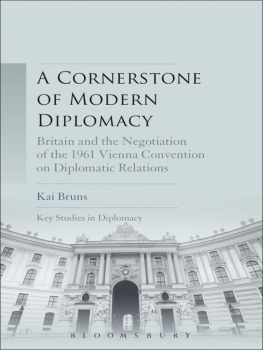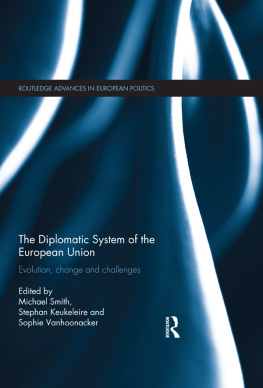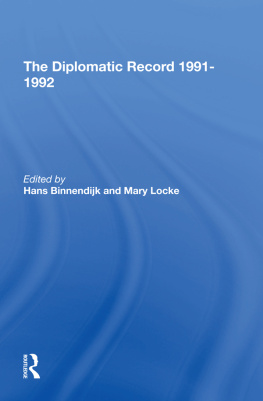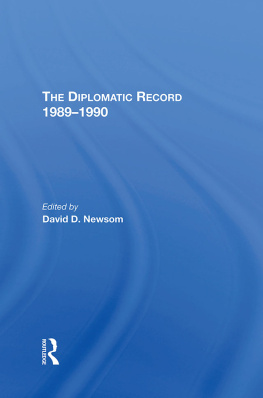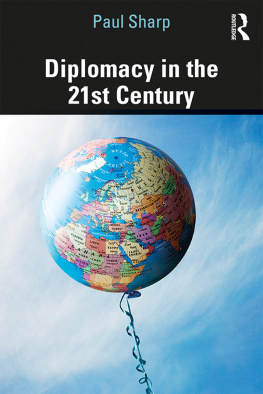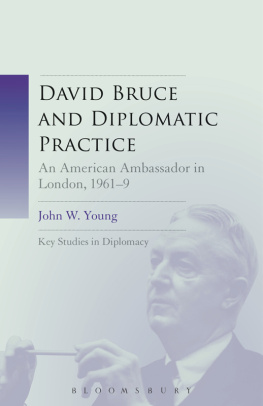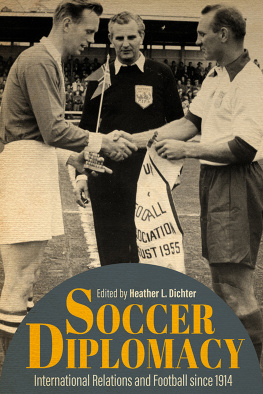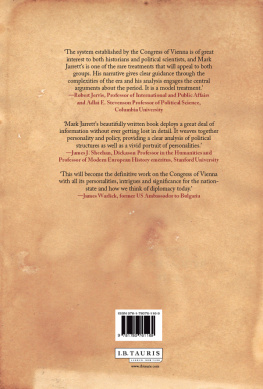A Cornerstone of Modern Diplomacy
About the Series
Key Studies in Diplomacy is an innovative series of books on the procedures and processes of diplomacy, focusing on the interaction between states through their accredited representatives, that is, diplomats.
Thus its volumes focus on factors affecting foreign policy, and the ways in which it is implemented, through the apparatus of diplomacy the diplomatic system in both bilateral and multilateral contexts. But they also examine how the diplomats are sometimes able to shape not just the presentation but even the substance of their states foreign policies. Given that the diplomatic system is worldwide, all the series volumes, whatever their individual focuses, contribute to an understanding of the nature of diplomacy. They do so authoritatively in that they are written by scholars specializing in diplomacy and by former diplomats and comprehensibly. They emphasize the actual practice of diplomacy and analyse that practice in a clear and accessible manner, hence making them essential primary reading for both beginning practitioners and advanced-level university students.
Series Editors
J. Simon Rofe and Giles Scott-Smith
Lorna Lloyd (Editor Emeritus)
Other Titles in the Series
21st Century Diplomacy by Kishan S. Rana
David Bruce and Diplomatic Practice by John W. Young
Embassies in Armed Conflict by G. R. Berridge
A Cornerstone of Modern Diplomacy
Britain and the Negotiation of the 1961 Vienna Convention on Diplomatic Relations
Kai Bruns
To Freya
Contents
My interest in the Negotiation of the 1961 Vienna Convention on Diplomatic Relations was stimulated by Dr Lorna Lloyd. I owe her a great intellectual debt. She provided invaluable advice, commented thoughtfully on the draft chapters and shared her academic expertise and editorial experience throughout all stages of the writing process.
The writing of this book has been almost entirely done during my PhD research at Keele University. I am grateful to the university, which extended funding for my PhD research and, thus, enabled this project in the first place. Also, I am particularly appreciative to Dr Helen Parr, Professor John Young, Professor Blent Gkay, Professor Alan James and Professor David Long for their enriching ideas and comments at different stages of research. Thanks remain also due to Bloomsburys editorial team, particularly Matthew Kopel and Kaitlin Fontana.
I want to thank Michael Martens and Andreas Heye for their invaluable assistance and encouragement. Moreover, I would like to express a huge thank you to Daniel Bosley and Casey Casler, who turned a multitude of my German-soaked English sentences into nice and neat English. Any that remain are, of course, my own responsibility.
My greatest appreciation goes to my wife, Freya, for her support, love and tolerance during the writing of this book.
Kai Bruns
Dubai
December 2013
| AJIL | American Journal of International Law |
| ASA | Austrian State Archive, Vienna |
| BCE | Board of Customs and Excise |
| BIR | Board of Inland Revenue |
| BoT | Board of Trade |
| BYIL | British Year Book of International Law |
| CRO | Commonwealth Relations Office |
| DEA | Department of External Affairs |
| DO | Dominions Office |
| DUS | Deputy under-secretary |
| FAO | Food and Agriculture Organization of the United Nations |
| FCO | Foreign and Commonwealth Office |
| FO | Foreign Office |
| FRG | Federal Republic of Germany |
| GPO | General Post Office |
| Great powers | The five permanent members of the United Nations Security Council |
| HC | High Commissioner |
| HCO | High Commissioners Offices |
| HMG | Her Majestys Government |
| ICJ | International Court of Justice |
| IIL | Institute of International Law |
| ILC | International Law Commission |
| ILC draft | The International Law Commissions draft Articles on Diplomatic Intercourse and Immunities, adopted at its tenth session, 28 April4 July 1958 |
| ILO | International Labour Organization |
| INA | Irish National Archives, Dublin |
| LCO | Lord Chancellors Office |
| MPNI | Ministry of Pensions and National Insurance |
| NAC | National Archives of Canada, Ottawa |
| PUS | Permanent under-secretary |
| Set of provisional drafts | Provisional draft Articles on Diplomatic Intercourse and Immuni-ties, adopted by the International Law Commission at its ninth session, 23 April28 June 1957 |
| Sixth Committee | The Sixth (Legal) Committee of the United Nations |
| T | Treasury |
| TNA | The National Archives: Public Records Office, Kew |
| TPA | The Political Archive, Berlin |
| UAR | United Arabic Republic |
| UK | United Kingdom |
| UN | United Nations |
| UNCDII | United Nations Conference on Diplomatic Intercourse and Immunities |
| UNESCO | United Nations Educational, Scientific and Cultural Organization |
| UNGA | United Nations General Assembly |
| USA | United States of America |
| USSR | Soviet Union |
| VCDR | Vienna Convention on Diplomatic Relations, 1961 |
| Vienna Conference | United Nations Conference on Diplomatic Intercourse and Immunities, 1961 |
| Vienna Convention | Vienna Convention on Diplomatic Relations, 1961 |
| YBUN | Yearbook of the United Nations |
| YILC | Yearbook of the International Law Commission |
The Vienna Convention on Diplomatic Relations (subsequently referred to as the VCDR or Vienna Convention) deals with one of the oldest subjects in the field of international law: diplomatic privileges and immunities. Some of its fundamental aspects, for example, those regarding precedence and classes of heads of mission, received their first codified form in 1815 at the Congress of Vienna while others have grown and evolved over centuries as part of international customary law. Although the Vienna Convention could never perfect the practice of diplomatic relations, politicians and diplomats alike had high hopes that the Vienna Convention could help avoid friction via the codification of established rules, and the clarification of those aspects of law where universal practice had yet to be established. When, in 1964, the British House of Commons gave a second reading to the Diplomatic Privileges Bill, Robert Mathew, the Under-Secretary of State for Foreign Affairs, anticipated that:
There is now every prospect that the Convention will achieve universal acceptance by the nations of the world. Her Majestys Government ha[s] consistently supported the work of the United Nations in the sphere of international law, and we are now glad to be able to welcome this Convention as one of its most valuable contributions to the development of the international rule of law.

